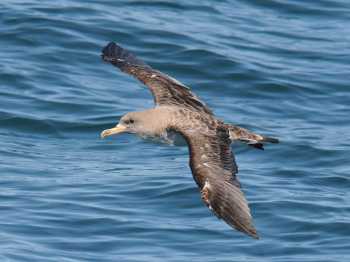Hany Alonso (Eco-ethology Research Unit, Lisbon, Portugal) and colleagues, writing in the journal Marine Biology, have looked at diet and foraging differences in Cory's Shearwaters breeding in the Portuguese Madeiran Islands in the North Atlantic Ocean.
The paper's abstract follows:
"In pelagic seabirds, who often explore distant food resources, information is usually scarce on the level of trophic segregation between parents and their offspring. To investigate this issue, we used GPS tracking, stable isotopes and dietary information of Cory's shearwaters Calonectris diomedea breeding in contrasting environments. Foraging trips at Selvagem Grande (an oceanic island) mainly targeted the distant African coast, while at Berlenga island (located on the continental shelf), shearwaters foraged mainly over nearby shelf waters. The degree of isotopic segregation between adults and chicks, based on δ13C, differed markedly between the two sites, indicating that adult birds at Selvagem fed their chicks with a mixture of shelf and offshore pelagic prey but assimilated more prey captured on coastal shelf waters. Isotopic differences between age classes at Berlenga were much smaller and may have resulted from limited dietary segregation or from age-related metabolic differences. The diet of shearwaters was also very different between the two colonies, with offshore pelagic prey only being detected at Selvagem Grande. Our findings suggest that spatial foraging constraints influence resource partitioning between pelagic seabirds and their offspring and can lead to a parent-offspring dietary segregation."

Cory's Shearwater at sea. Photograph by John Graham
Reference:
Alonso, H., Granadeiro, J.P., Paiva, V.H., Dias, A.S., Ramos, J.A. & Catry, P. 2012. Parent-offspring dietary segregation of Cory's shearwaters breeding in contrasting environments. Marine Biology DOI: 10.1007/s00227-012-1900.
John Cooper, ACAP Information Officer, 4 April 2012

 English
English  Français
Français  Español
Español